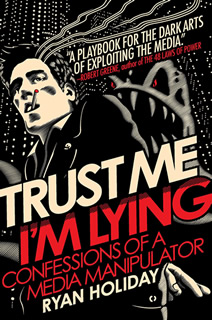 One of the best books I read in 2012 was Trust Me, I’m Lying: Confessions of a Media Manipulator by Ryan Holiday. If you’re a blogger or an avid media consumer, it’s an essential read.
One of the best books I read in 2012 was Trust Me, I’m Lying: Confessions of a Media Manipulator by Ryan Holiday. If you’re a blogger or an avid media consumer, it’s an essential read.
Holiday outlines the controversial strategies he created to exploit online media economics to change public perception and sell products – about behind the scenes in the blogging, PR and online media systems.
He is a media strategist whose campaigns have been used as case studies by Twitter, YouTube and Google, and has been written about by AdAge, the New York Times, Gawker and Fast Company.
Holiday introduces the book with:
“I didn’t intend to, but I’ve helped pioneer a media system designed to trick, cajole, and steal every second of the most precious resource in the world – people’s time. I’m going to show you every single one of these tricks, and what they mean. What you choose to do with this information is up to you.”
The book is blunt, very cynical and dark in places. You’re left wondering if you should play the game, or avoid it totally, and how much the blogs you read are playing it too.
“Everything you consume online has been optimized to make you dependent on it. Content is engineered to be clicked, glanced at, or found – like a trap designed to bait, distract, and capture you. Blogs are out to game you – to steal your time and sell it to advertisers.”
(Holiday uses the word “blog” a lot in his book, but he uses it to refer to all online publishing as he considers them all run by the same incentives and all are fighting for your attention.)
When veteran blogger Andrew Sullivan recently announced he was leaving The Daily Beast and taking his blog The Dish to be solely funded by user subscriptions he echoes the core of Holiday’s book when he says:
“…online ads have created incentives for pageviews over quality content…we want to set up the incentives so we are geared entirely to improving the total reader experience, not to ratchet up hits, or to please corporate advertisers….no pressure for pageviews … just a concept designed to make your reading experience as good as possible, and to lead us not into temptation.”
Over the next few days, I’ll be posting notes I took from the book in the section below and would love your feedback on them!
How the media works
- Blogs compete to get stories first.
- Newspapers compete to “confirm” it.
- Pundits compete for airtime to opine on it.
How blogs work
- Blogs need things to cover: the blog that covers the most stuff wins.
- Blogs need to make money: the blog that has high traffic wins.
- Traffic becomes more important than the truth: blogs create artificial content which is made real and impacts the outcome of real world events.
How blogs make money
- Blogs make money from selling ads.
- Traffic is money.
- Exclusive scoops are traffic.
- Exclusive scoops are rare and usually hard work to get.
- Pseudo-scoops (manufactured or stolen) are easier to obtain.
- Blogs build a name by courting controversy and using big (online names). Historically, media was about protecting their reputation.
- Blogs are built to be sold.
- Traffic growth and brand recognition is more important than trust.
- Scale is more important than business sense.
How to get bloggers to promote your cause
- Blog writers don’t get paid much.
- Freebees and affiliate deals are an easy way to get coverage.
- Bloggers want to transition into jobs at old media or tech companies. Help them build their reputation by giving them big stories to help their career.
Get actionable tips to grow your website
Thoughtful weekly insights (no hype!) on improving your website